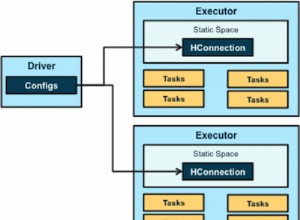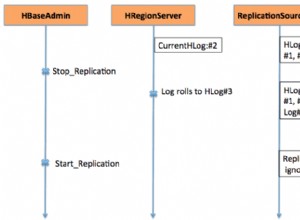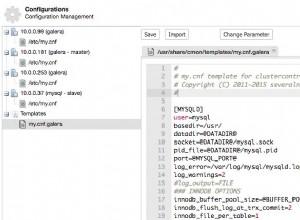Eine „stark typisierte“ API, die auf dem C#-Redis-Client von Service Stack verfügbar ist, um alle Redis-Wertoperationen für alle c#-Typen anzuwenden
Streng typisierte generische Client-API-Nr.
Unten ist die stark typisierte API, auf die Sie Zugriff haben, nachdem Sie IRedisClient.As<T>() aufgerufen haben zB:
using (var redisClient = new RedisClient())
{
var redis = redisClient.As<MyPocoType>();
}
Die redis-Variable enthält jetzt einen stark typisierten generischen Client, mit dem Redis-Wertoperationen auf MyPocoType angewendet werden können . Die folgende Schnittstelle listet alle verfügbaren Operationen auf:
public interface IRedisTypedClient<T>
: IBasicPersistenceProvider<T>
{
IHasNamed<IRedisList<T>> Lists { get; set; }
IHasNamed<IRedisSet<T>> Sets { get; set; }
IHasNamed<IRedisSortedSet<T>> SortedSets { get; set; }
IRedisHash<TKey, T> GetHash<TKey>(string hashId);
IRedisTypedTransaction<T> CreateTransaction();
IDisposable AcquireLock();
IDisposable AcquireLock(TimeSpan timeOut);
int Db { get; set; }
List<string> GetAllKeys();
T this[string key] { get; set; }
string SequenceKey { get; set; }
void SetSequence(int value);
int GetNextSequence();
RedisKeyType GetEntryType(string key);
string GetRandomKey();
void SetEntry(string key, T value);
void SetEntry(string key, T value, TimeSpan expireIn);
bool SetEntryIfNotExists(string key, T value);
T GetValue(string key);
T GetAndSetValue(string key, T value);
bool ContainsKey(string key);
bool RemoveEntry(string key);
bool RemoveEntry(params string[] args);
bool RemoveEntry(params IHasStringId[] entities);
int IncrementValue(string key);
int IncrementValueBy(string key, int count);
int DecrementValue(string key);
int DecrementValueBy(string key, int count);
bool ExpireEntryIn(string key, TimeSpan expiresAt);
bool ExpireEntryAt(string key, DateTime dateTime);
TimeSpan GetTimeToLive(string key);
void Save();
void SaveAsync();
void FlushDb();
void FlushAll();
T[] SearchKeys(string pattern);
List<T> GetValues(List<string> keys);
List<T> GetSortedEntryValues(IRedisSet<T> fromSet, int startingFrom, int endingAt);
HashSet<T> GetAllItemsFromSet(IRedisSet<T> fromSet);
void AddItemToSet(IRedisSet<T> toSet, T item);
void RemoveItemFromSet(IRedisSet<T> fromSet, T item);
T PopItemFromSet(IRedisSet<T> fromSet);
void MoveBetweenSets(IRedisSet<T> fromSet, IRedisSet<T> toSet, T item);
int GetSetCount(IRedisSet<T> set);
bool SetContainsItem(IRedisSet<T> set, T item);
HashSet<T> GetIntersectFromSets(params IRedisSet<T>[] sets);
void StoreIntersectFromSets(IRedisSet<T> intoSet, params IRedisSet<T>[] sets);
HashSet<T> GetUnionFromSets(params IRedisSet<T>[] sets);
void StoreUnionFromSets(IRedisSet<T> intoSet, params IRedisSet<T>[] sets);
HashSet<T> GetDifferencesFromSet(IRedisSet<T> fromSet, params IRedisSet<T>[] withSets);
void StoreDifferencesFromSet(IRedisSet<T> intoSet, IRedisSet<T> fromSet, params IRedisSet<T>[] withSets);
T GetRandomItemFromSet(IRedisSet<T> fromSet);
List<T> GetAllItemsFromList(IRedisList<T> fromList);
List<T> GetRangeFromList(IRedisList<T> fromList, int startingFrom, int endingAt);
List<T> SortList(IRedisList<T> fromList, int startingFrom, int endingAt);
void AddItemToList(IRedisList<T> fromList, T value);
void PrependItemToList(IRedisList<T> fromList, T value);
T RemoveStartFromList(IRedisList<T> fromList);
T BlockingRemoveStartFromList(IRedisList<T> fromList, TimeSpan? timeOut);
T RemoveEndFromList(IRedisList<T> fromList);
void RemoveAllFromList(IRedisList<T> fromList);
void TrimList(IRedisList<T> fromList, int keepStartingFrom, int keepEndingAt);
int RemoveItemFromList(IRedisList<T> fromList, T value);
int RemoveItemFromList(IRedisList<T> fromList, T value, int noOfMatches);
int GetListCount(IRedisList<T> fromList);
T GetItemFromList(IRedisList<T> fromList, int listIndex);
void SetItemInList(IRedisList<T> toList, int listIndex, T value);
//Queue operations
void EnqueueItemOnList(IRedisList<T> fromList, T item);
T DequeueItemFromList(IRedisList<T> fromList);
T BlockingDequeueItemFromList(IRedisList<T> fromList, TimeSpan? timeOut);
//Stack operations
void PushItemToList(IRedisList<T> fromList, T item);
T PopItemFromList(IRedisList<T> fromList);
T BlockingPopItemFromList(IRedisList<T> fromList, TimeSpan? timeOut);
T PopAndPushItemBetweenLists(IRedisList<T> fromList, IRedisList<T> toList);
void AddItemToSortedSet(IRedisSortedSet<T> toSet, T value);
void AddItemToSortedSet(IRedisSortedSet<T> toSet, T value, double score);
bool RemoveItemFromSortedSet(IRedisSortedSet<T> fromSet, T value);
T PopItemWithLowestScoreFromSortedSet(IRedisSortedSet<T> fromSet);
T PopItemWithHighestScoreFromSortedSet(IRedisSortedSet<T> fromSet);
bool SortedSetContainsItem(IRedisSortedSet<T> set, T value);
double IncrementItemInSortedSet(IRedisSortedSet<T> set, T value, double incrementBy);
int GetItemIndexInSortedSet(IRedisSortedSet<T> set, T value);
int GetItemIndexInSortedSetDesc(IRedisSortedSet<T> set, T value);
List<T> GetAllItemsFromSortedSet(IRedisSortedSet<T> set);
List<T> GetAllItemsFromSortedSetDesc(IRedisSortedSet<T> set);
List<T> GetRangeFromSortedSet(IRedisSortedSet<T> set, int fromRank, int toRank);
List<T> GetRangeFromSortedSetDesc(IRedisSortedSet<T> set, int fromRank, int toRank);
IDictionary<T, double> GetAllWithScoresFromSortedSet(IRedisSortedSet<T> set);
IDictionary<T, double> GetRangeWithScoresFromSortedSet(IRedisSortedSet<T> set, int fromRank, int toRank);
IDictionary<T, double> GetRangeWithScoresFromSortedSetDesc(IRedisSortedSet<T> set, int fromRank, int toRank);
List<T> GetRangeFromSortedSetByLowestScore(IRedisSortedSet<T> set, string fromStringScore, string toStringScore);
List<T> GetRangeFromSortedSetByLowestScore(IRedisSortedSet<T> set, string fromStringScore, string toStringScore, int? skip, int? take);
List<T> GetRangeFromSortedSetByLowestScore(IRedisSortedSet<T> set, double fromScore, double toScore);
List<T> GetRangeFromSortedSetByLowestScore(IRedisSortedSet<T> set, double fromScore, double toScore, int? skip, int? take);
IDictionary<T, double> GetRangeWithScoresFromSortedSetByLowestScore(IRedisSortedSet<T> set, string fromStringScore, string toStringScore);
IDictionary<T, double> GetRangeWithScoresFromSortedSetByLowestScore(IRedisSortedSet<T> set, string fromStringScore, string toStringScore, int? skip, int? take);
IDictionary<T, double> GetRangeWithScoresFromSortedSetByLowestScore(IRedisSortedSet<T> set, double fromScore, double toScore);
IDictionary<T, double> GetRangeWithScoresFromSortedSetByLowestScore(IRedisSortedSet<T> set, double fromScore, double toScore, int? skip, int? take);
List<T> GetRangeFromSortedSetByHighestScore(IRedisSortedSet<T> set, string fromStringScore, string toStringScore);
List<T> GetRangeFromSortedSetByHighestScore(IRedisSortedSet<T> set, string fromStringScore, string toStringScore, int? skip, int? take);
List<T> GetRangeFromSortedSetByHighestScore(IRedisSortedSet<T> set, double fromScore, double toScore);
List<T> GetRangeFromSortedSetByHighestScore(IRedisSortedSet<T> set, double fromScore, double toScore, int? skip, int? take);
IDictionary<T, double> GetRangeWithScoresFromSortedSetByHighestScore(IRedisSortedSet<T> set, string fromStringScore, string toStringScore);
IDictionary<T, double> GetRangeWithScoresFromSortedSetByHighestScore(IRedisSortedSet<T> set, string fromStringScore, string toStringScore, int? skip, int? take);
IDictionary<T, double> GetRangeWithScoresFromSortedSetByHighestScore(IRedisSortedSet<T> set, double fromScore, double toScore);
IDictionary<T, double> GetRangeWithScoresFromSortedSetByHighestScore(IRedisSortedSet<T> set, double fromScore, double toScore, int? skip, int? take);
int RemoveRangeFromSortedSet(IRedisSortedSet<T> set, int minRank, int maxRank);
int RemoveRangeFromSortedSetByScore(IRedisSortedSet<T> set, double fromScore, double toScore);
int GetSortedSetCount(IRedisSortedSet<T> set);
double GetItemScoreInSortedSet(IRedisSortedSet<T> set, T value);
int StoreIntersectFromSortedSets(IRedisSortedSet<T> intoSetId, params IRedisSortedSet<T>[] setIds);
int StoreUnionFromSortedSets(IRedisSortedSet<T> intoSetId, params IRedisSortedSet<T>[] setIds);
bool HashContainsEntry<TKey>(IRedisHash<TKey, T> hash, TKey key);
bool SetEntryInHash<TKey>(IRedisHash<TKey, T> hash, TKey key, T value);
bool SetEntryInHashIfNotExists<TKey>(IRedisHash<TKey, T> hash, TKey key, T value);
void SetRangeInHash<TKey>(IRedisHash<TKey, T> hash, IEnumerable<KeyValuePair<TKey, T>> keyValuePairs);
T GetValueFromHash<TKey>(IRedisHash<TKey, T> hash, TKey key);
bool RemoveEntryFromHash<TKey>(IRedisHash<TKey, T> hash, TKey key);
int GetHashCount<TKey>(IRedisHash<TKey, T> hash);
List<TKey> GetHashKeys<TKey>(IRedisHash<TKey, T> hash);
List<T> GetHashValues<TKey>(IRedisHash<TKey, T> hash);
Dictionary<TKey, T> GetAllEntriesFromHash<TKey>(IRedisHash<TKey, T> hash);
}
Gemeinsame Datenzugriffsschnittstelle #
Einschließlich der oben genannten Methoden implementiert der generische Client auch Redis-unspezifische allgemeine Datenzugriffsvorgänge, die problemlos von anderen Datenpersistenzanbietern implementiert werden können, falls Sie in Zukunft den Anbieter wechseln möchten.
public interface IBasicPersistenceProvider<T>
: IDisposable
{
T GetById(string id);
IList<T> GetByIds(ICollection<string> ids);
IList<T> GetAll();
T Store(T entity);
void StoreAll(IEnumerable<T> entities);
void Delete(T entity);
void DeleteById(string id);
void DeleteByIds(ICollection<string> ids);
void DeleteAll();
}
Wenn Sie nur grundlegende Persistenzanforderungen haben, würde ich im Allgemeinen empfehlen, gegen die oben genannte allgemeine Datenzugriffs-API zu entwickeln, da dies für andere Persistenzanbieter einfacher zu implementieren ist und die Wahrscheinlichkeit erhöht, dass Ihre Bibliothek unverändert wiederverwendet werden kann, um sie für andere Datenspeicher zu persistieren d.h. gegen ein RDBMS mit OrmLite, etc.




